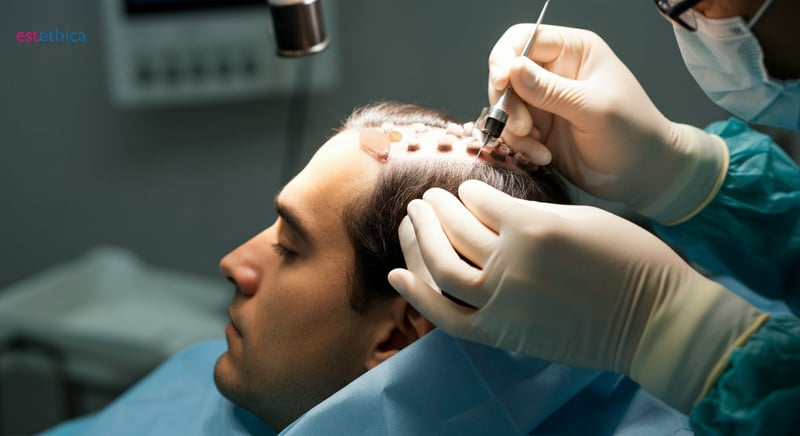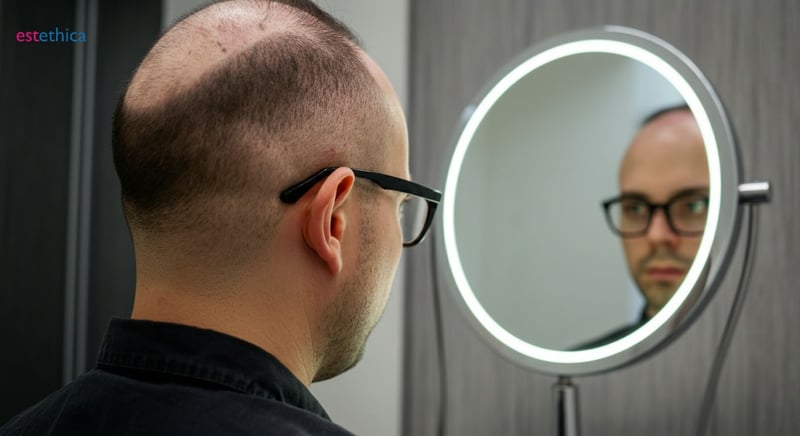Revolutionizing Hair Transplants: Discover New Insights
Revolutionize your understanding of hair transplants with the latest insights on FUE and SMP techniques, recovery tips, and celebrity experiences in hair restoration.
Hair transplantation has evolved significantly over the years, offering more natural results with less recovery time. This blog explores the complexities of hair transplant surgeries, the latest techniques, and what you can expect if considering this transformative procedure. We'll dive into the differences between popular techniques such as Follicular Unit Extraction (FUE) and Scalp Micropigmentation (SMP), and offer recovery tips. Additionally, we'll examine the impact of celebrity endorsements on the industry's perception and credibility.
Understanding Hair Transplant Surgery: What to Expect
Setting Realistic Expectations for Hair Transplant Surgery
Hair transplant surgery, particularly techniques like follicular unit extraction (FUE), offers a promising solution for those experiencing hair loss. This procedure involves extracting hair follicles from a donor site, typically the back of the head, and implanting them into balding areas. Understanding this process is crucial for setting realistic expectations. Patients should anticipate minor discomforts, such as swelling or itching, and be prepared for the timeline of growth and recovery. For instance, new hair growth usually begins around three months post-surgery, with significant results visible after a year.
Key Considerations for Hair Transplant Surgery
- Choosing the right clinic: Research the best hair transplant clinics for quality care.
- Understanding recovery time: Recovery varies, but most patients resume normal activities within a week.
- Exploring affordable options: Consider clinics offering affordable hair transplant options without compromising quality.
These considerations are essential for anyone contemplating hair transplant surgery. By focusing on these aspects, patients can ensure a smoother experience and better outcomes.
The Hair Transplant Process: A Step-by-Step Guide
- Consultation: Discuss goals and assess suitability for hair transplant surgery.
- Preparation: The donor area is prepared, and hair follicles are extracted.
- Implantation: Follicles are implanted into the recipient area, ensuring natural hairline design.
Each step in the hair transplant process is crucial for achieving the desired results. From consultation to implantation, understanding these phases helps patients prepare mentally and physically for the journey ahead.

Exploring Hair Restoration Techniques: FUE vs. SMP
Understanding the Differences Between FUE and SMP
When considering hair restoration, it's essential to understand the differences between Follicular Unit Extraction (FUE) and Scalp Micropigmentation (SMP). FUE is a surgical procedure that involves extracting individual hair follicles from a donor area and implanting them into balding regions. This technique is renowned for promoting natural hair growth and is often chosen by those seeking a permanent solution to hair loss. On the other hand, SMP is a non-surgical method that uses pigmentation to create the appearance of a fuller scalp. This technique is ideal for individuals who prefer a less invasive approach or have insufficient donor hair for transplantation.
Key Features of FUE and SMP
- FUE: Offers natural hair growth and minimal scarring, making it a popular choice for those seeking a permanent solution.
- SMP: Provides the illusion of density through pigmentation, suitable for individuals with limited donor hair.
- Both techniques: Ensure minimal recovery time, allowing patients to resume normal activities quickly.
Choosing between FUE and SMP depends on individual needs and desired outcomes. For instance, someone with a receding hairline might opt for FUE to achieve a natural look, while another person might choose SMP for a quick aesthetic enhancement.
Deciding on the Right Technique
- Assess Your Needs: Determine whether you seek natural hair growth or a cosmetic enhancement.
- Consult a Specialist: Discuss your goals with a hair restoration expert to explore suitable options.
- Consider Recovery and Maintenance: Evaluate the recovery time and maintenance required for each technique.
By understanding these steps, individuals can make informed decisions about their hair restoration journey. Whether opting for FUE or SMP, consulting with professionals ensures the best possible outcome tailored to personal preferences and hair restoration goals.

Navigating Hair Transplant Recovery: Tips for Success
Effective Post-Transplant Care for Optimal Results
Post-operative care is crucial for a successful hair transplant recovery. Patients should follow specific guidelines to ensure optimal healing and hair growth. For instance, using recommended shampoos helps maintain scalp hygiene without irritating the sensitive areas. Additionally, avoiding direct sunlight and harsh weather conditions protects the newly transplanted hair follicles. It's also advisable to refrain from strenuous activities that might cause sweating, as this can affect the grafts' stability.
Understanding the Recovery Timeline
- Initial Days: Expect some swelling and redness; follow prescribed medication and care routines.
- First Month: Hair shedding is normal; continue gentle scalp care and avoid scratching.
- Three to Six Months: Noticeable hair growth begins; maintain a balanced diet to support hair health.
Understanding this timeline helps manage expectations and ensures that patients remain patient and committed to their recovery process. Each phase is vital for achieving the desired outcome, and adhering to care instructions significantly enhances the success of the hair transplant.
Key Factors Influencing Recovery
- Method Used: Techniques like DHI offer faster recovery due to minimal invasiveness.
- Individual Health: Overall health and lifestyle choices impact healing and hair growth.
- Clinic Expertise: Choosing experienced professionals ensures proper guidance and support throughout recovery.
These factors play a significant role in the recovery process. For example, individuals who undergo a hairline transplant with a reputable clinic often experience smoother recoveries. Furthermore, understanding the prices for hair transplant in the UK or considering a hair transplant in Turkey can influence decisions based on available expertise and recovery support.

Celebrity Hair Transplants: What We Can Learn
Lessons from Celebrity Hair Transplants
Celebrity hair transplants have become a beacon of hope for many considering hair restoration. These high-profile cases highlight the transformative power of modern hair transplant surgery. For instance, celebrities often choose advanced techniques like follicular unit extraction (FUE) to achieve natural-looking results. This choice underscores the importance of selecting the right method for individual needs.
The Influence of Celebrity Endorsements
- Increased Awareness: Celebrity stories raise awareness about hair restoration options.
- Boosted Confidence: Seeing successful outcomes encourages others to consider hair transplants.
- Highlighting Techniques: Celebrities often use cutting-edge methods, showcasing their effectiveness.
These endorsements not only increase public interest but also educate potential patients about the possibilities of hair restoration. For example, a well-known actor's successful hairline transplant can inspire others to explore similar solutions.
Understanding the Impact of Celebrity Choices
- Research: Celebrities often consult top experts, emphasizing the importance of choosing the right clinic.
- Technique Selection: Their preference for advanced techniques highlights the benefits of modern methods.
- Recovery Insights: Observing their recovery process provides realistic expectations for potential patients.
By examining these choices, individuals can gain valuable insights into the hair restoration journey. Whether considering a hair transplant in Turkey or exploring prices for hair transplant in the UK, understanding celebrity experiences can guide personal decisions. Ultimately, these stories serve as powerful testimonials to the advancements and reliability of hair restoration techniques.
Advanced Hair Restoration Techniques: FUE and SMP
Excellence in Hair Transplant Recovery: Ensuring Success
Frequently Asked Questions
What is the difference between Follicular Unit Extraction (FUE) and Scalp Micropigmentation (SMP)?
How does hair transplant surgery work?
What are the key factors influencing hair transplant recovery?
How do celebrity hair transplants impact public perception?
What should I consider when choosing a hair transplant clinic?
Discover the path to your healthiest and most beautiful self with estethica's award-winning services. Call now for a free consultation and let our expert team guide you towards your aesthetic goals.
📞 Schedule Your Free Consultation Today!